Public Health News
CDC Center of Excellence
The New York State Wastewater Surveillance Network, which began as a pilot project led by Syracuse University faculty member David Larsen in the early days of the COVID-19 pandemic, will soon support communities nationwide—and potentially around the globe—to detect and minimize the spread of infectious diseases.
The network’s expanded reach is the result of its recent designation as a Centers for Disease Control and Prevention (CDC) Northeast Region Center of Excellence. The designation recognizes the network’s exemplary performance in the early detection and monitoring of communicable diseases as well as the innovative research coming from Larsen’s group. It also provides the new Center of Excellence with $1 million in CDC funding. Approximately $500,000 of that amount will support the University’s continuing affiliated operations and research.
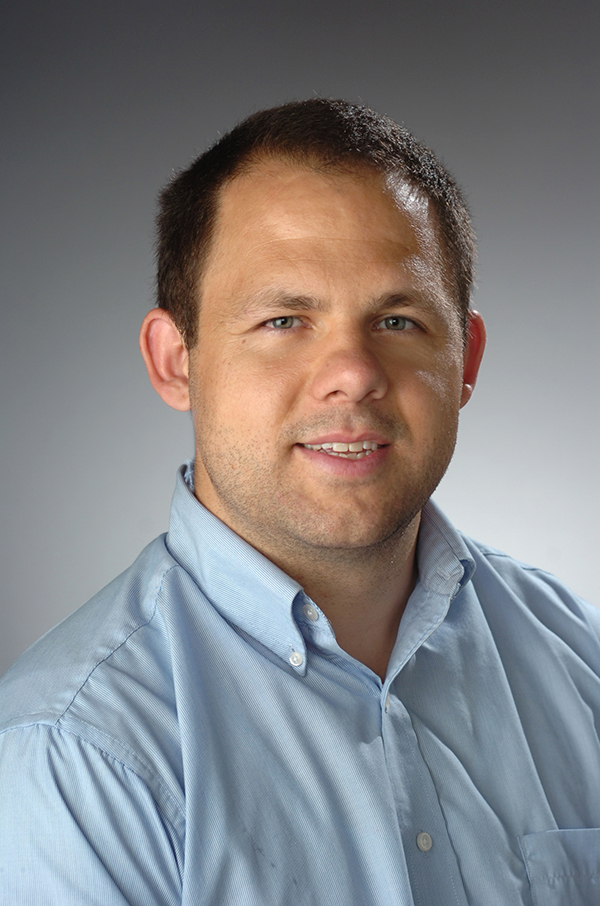
Larsen, public health department chair and professor in the Falk College of Sport and Human Dynamics, is gratified by the recognition, which is a nod to the program’s vast potential.
“I had a vision for the New York State Water Surveillance Network, but to be named a federal CDC Center of Excellence is just a real honor,” Larsen says. “What we’re doing now is building systems that will keep people healthier; operational processes that let people live more freely and improve the public health response are the ultimate goal.”
Larsen, members of his research team and their partner in the network, the New York State Department of Health (NYS DOH) and its Wadsworth Center, met earlier this month to formalize goals for their work with the CDC.
Early Response
Not long after COVID-19 was named a global pandemic, Larsen assembled a team of researchers from the Falk College, the College of Engineering and Computer Science, the SUNY College of Environmental Science and Forestry and SUNY Upstate Medical University to begin developing the wastewater surveillance technology that would eventually become critical to New York State’s response to the disease. The team built a grassroots network that included sewage treatment plant operators, lab technicians and public health program workers to collect sewage samples, test for coronavirus, and report and share results.
The initiative first benefited Onondaga County and the University and soon expanded through the NYS DOH partnership. Today, the New York State network operates in all 62 counties and covers a population of more than 15 million. Testing has expanded beyond COVID to aid response to polio, mpox, influenza, RSV, hepatitis A, norovirus and antimicrobial-resistant genes.
Essential Partnership
A total of $43 million, including $28 million from the CDC and $15 million from New York State, has already been invested in the state’s disease wastewater surveillance efforts, according to Daniel Lang, NYS DOH deputy director of the Center of Environmental Health. He says the program’s efficacy and extensive operational network distinguished it for selection as a CDC Center of Excellence.
“Our partnership with Syracuse University was essential right from the start of the pandemic,” Lang says. “We worked with Dave Larsen’s team to establish a comprehensive statewide wastewater surveillance program, an impressive tool we didn’t have before. It provides universal coverage to assess disease trends and detect where variants are popping up, plus a system that reports back to community participants. Now, we’ll be able to expand the expertise we’ve developed here to other jurisdictions around the country.”
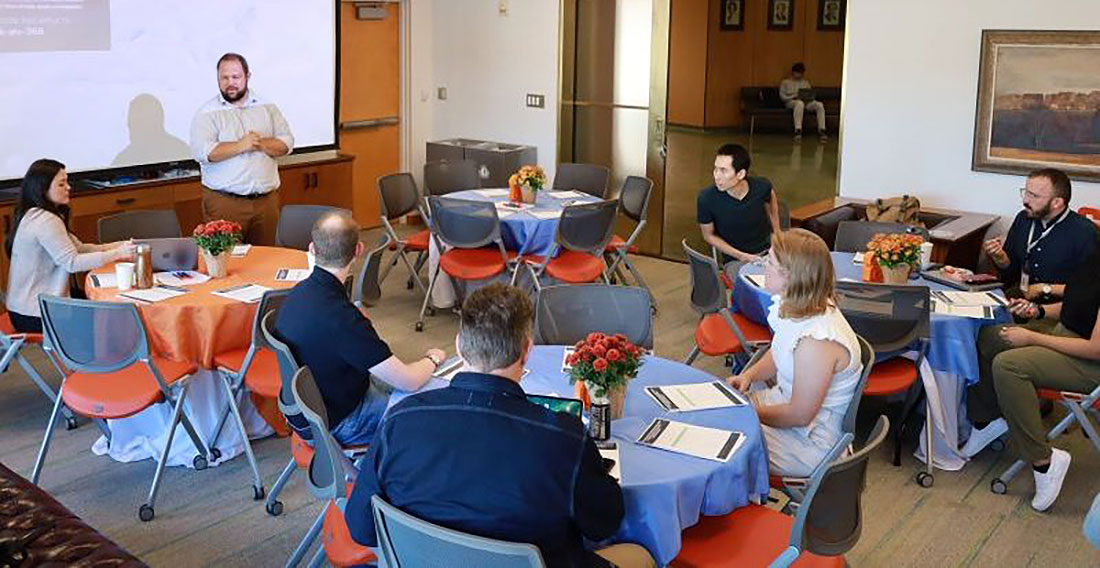
Backenson says the CDC designation “shows that we are a leader in this, and it allows us the resources to train others in what we do. Now, we’ll be teaching other cities, counties and regions. We’re proud to be part of it.”
As the CDC Northeast Region Center of Excellence, the team’s work will support several New England states plus Puerto Rico and the U.S. Virgin Islands. The researchers and health officials also want to coordinate with the CDC’s five other wastewater surveillance Centers of Excellence comprising the National Wastewater Surveillance System. They plan to share research and offer education and training on their operating protocols, efforts that could benefit communities throughout the U.S. and potentially impact disease-detection
Global Potential
Larsen’s research on infectious disease surveillance and the public health response to these threats will also help people around the globe. He recently completed a Fulbright U.S. Scholar Award program in Austria at the Medical University of Innsbruck where he worked with the Austrian wastewater surveillance network. He also spoke about the approach at a technology roundtable at the White House last month.
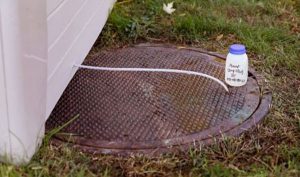
Larsen’s team is now transitioning program operations to NYS DOH, which will permit the researchers to refocus on how these systems can support public health responses to infectious diseases and “dive deeper to maximize the benefits of the systems,” he says.
Public health functions dealing with infectious disease surveillance alert us to when a community is at increased risk and also confirm when a community is no longer at risk,” Larsen says. “Wastewater test results provide awareness of both aspects and key information needed to decide whether to close down community operations or keep them open and operating. Wastewater is a great way to gauge these elements and may be one of the most cost-effective ways to confirm levels of community risk.”
A Syracuse University News story by Diane Stirling originally published on Sept. 24, 2024.
Innovative Leaders
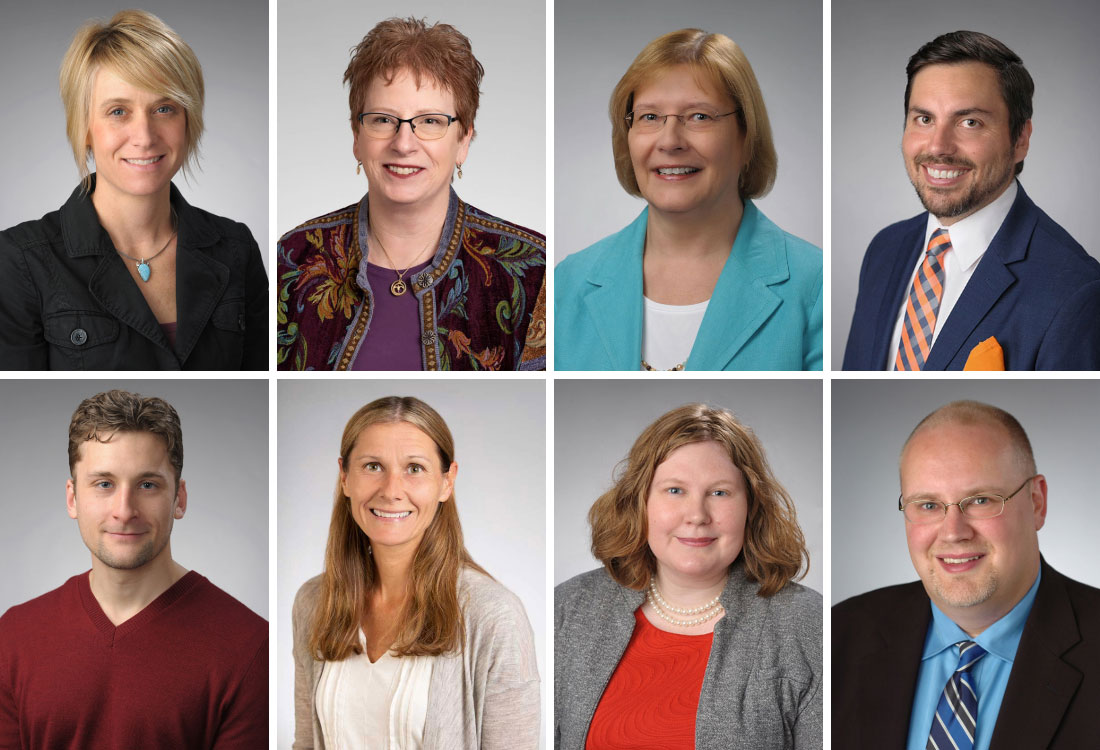
The Falk College of Sport and Human Dynamics is proud to announce the promotion of the following eight distinguished faculty members for the 2024-25 academic year:
Jane Burrell and Mary Kiernan from the Department of Nutrition and Food Studies; Jennifer Genovese and Ryan Heath (with tenure) from the School of Social Work; Bryce Hruska (with tenure) from the Department of Public Health; Rachel Razza and Sara Vasilenko (with tenure) from the Department of Human Development and Family Science; and Patrick Walsh from the Department of Sport Management.
The departments’ Promotion and Tenure committees, along with the Falk College Promotion and Tenure Committee, recommended the promotions after reviewing the faculty members’ areas of teaching, scholarship, research, and service. Recommendations from the Falk committees and Falk College Dean Jeremy S. Jordan were submitted to the Syracuse University Office of Academic Affairs and the University’s Board of Trustees, which granted the promotions.
“The recent promotions at Falk College reflect the exceptional caliber of our faculty,” Jordan says. “These individuals have demonstrated outstanding achievements in teaching, scholarship, and service as rigorously evaluated by departmental and college-wide committees and external reviewers. Their advancement is a testament to their significant contributions and the high standards of excellence we uphold at Falk College and Syracuse University.”
Here’s a look at Falk College’s recently promoted faculty members:
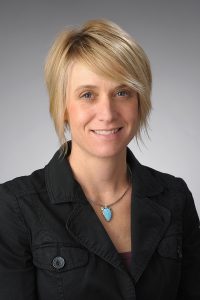
Jane Burrell
Full Teaching Professor, Department of Nutrition and Food Studies
Jane Burrell, M.S., RD, CDN, joined Syracuse University as an Instructor of Nutrition in 2009 and became an Associate Teaching Professor in 2018. Burrell teaches a variety of courses exemplifying her value to the Nutrition and Science Dietetics program, and she had taken advantage of resources at Syracuse University and externally to constantly update her courses and pedagogical approaches.
Burrell received the 2023 Falk College Faculty of the Year Teaching Award, and her student teaching evaluations and peer evaluations are consistently excellent. She has contributed service to her profession, the community, Syracuse University, Falk College and her department in several ways, including as a consultant on nutrition education issues with McGraw Hill Publishing; private consultant with the Syracuse Crunch men’s professional hockey team and the Syracuse University women’s rowing and ice hockey teams; and as a member of the Faculty Senate’s Women’s Concerns Committee.
From Department of Nutrition and Food Studies Chair and Associate Professor Lynn Brann:
“Professor Burrell continually seeks new methods for delivering content and engaging with students. She brings her previous clinical practice work into the classroom to provide students with examples of real-life experiences. This is particularly relevant as she teaches courses within the accredited programs of nutrition and students can relate content to their future potential practice.
“Professor Burrell excels in teaching and has demonstrated effectiveness in teaching smaller graduate seminar courses as well as the large (380 person) introductory nutrition course. She provides leadership in teaching and learning within the nutrition programs and the department. Colleagues see her as a valued resource for sharing teaching methods and techniques for effectiveness. Additionally, Professor Burrell is highly available to students, and she provides a welcoming environment to students in her classes and beyond.”
Learn more about Jane Burrell.
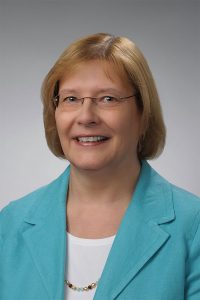
Jennifer Genovese
Associate Teaching Professor, School of Social Work
Jennifer Genovese, A.C.S.W., Ph.D., joined Syracuse University as an adjunct instructor in both Child and Family Studies and Social Work in 2010 and became an Assistant Teaching Professor of Social Work in 2018. Genovese is a skilled and versatile instructor who teaches an impressive array of courses central to the Master of Social Work program.
Genovese’s students clearly enjoy her teaching style and commitment to her profession, and her ability to draw on her professional experience is a consistent theme in her students’ evaluations. She has contributed substantial service during her time at Falk College, including serving as the Master of Social Work Program Director and on several departmental committees; mentoring adjunct faculty; and advising the Social Workers United student group.
From School of Social Work Chair and Professor Carrie Smith:
“Jennifer Genovese is a well-respected and highly sought after mental health practitioner in Central New York. She is also an inspiring teacher. We are very pleased with her recent promotion to Associate Teaching Professor and excited about her continued contributions and leadership in our M.S.W. (Master of Social Work) program.”
Learn more about Jennifer Genovese.
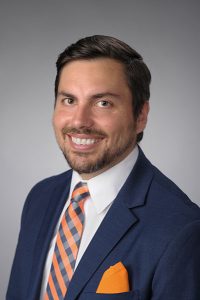
Ryan Heath
Associate Professor with Tenure, School of Social Work
Ryan Heath, L.C.S.W., Ph.D., joined the Syracuse University faculty in 2018 and quickly established a productive and coherent research and grant agenda. Heath has been successful in securing external funding to support his research program. As of Spring 2024, he had been a part of over $15 million in external grants, with $685,000 being awarded to him directly.
This early success in securing external funding demonstrates strong potential future accomplishments related to funding. He is also an active early career scholar as evidenced by his 11 peer-reviewed articles, six of which he serves as lead author. Heath publishes in a wide range of journals, demonstrating the interdisciplinary focus of his scholarship.
From School of Social Work Chair and Professor Carrie Smith:
“The School of Social Work is very pleased that Ryan Heath was promoted to Associate Professor with tenure. Ryan’s research seeks to understand how organized activities during out-of-school time (OST) and community schools promote the healthy development of students from under-resourced backgrounds, students of color, and other historically marginalized youth. His community-engaged research holds great promise for building initiatives that will expand and improve community schools across Central and Western New York. We are proud to have him as our colleague.”
Learn more about Ryan Heath.
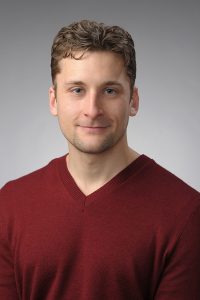
Bryce Hruska
Associated Professor with Tenure, Department of Public Health
Bryce Hruska, Ph.D., joined Syracuse University in 2015 as a Post-Doctoral Fellow, advanced to a Research Assistant Professor in 2017, and was appointed as a tenure-track Assistant Professor in 2018. During this time, he has established an effective and innovative curriculum/teaching/advising profile at the undergraduate and graduate levels. He typically teaches courses focused on research methods and data analysis and has reliably received high ratings on course evaluations.
Hruska has established a productive and coherent research and grant agenda. He has published 38 peer-reviewed articles in quality journals with 18 as lead author, establishing his ability to lead research activities. Hruska has an impressive record of external funding as evidenced by recent success in securing federal NIH (National Institutes of Health) funding.
From Department of Public Health Chair and Professor David Larsen:
“I’m very pleased to see Dr. Bryce Hruska earn promotion to the rank of Associate Professor with tenure,” Larsen says. “His research in traumatic stress holds great promise for better understanding and responding to the complex mental health burdens our society faces. I look forward to continuing to work with him, and am proud to have him as a colleague in the Public Health department.”
Learn more about Bryce Hruska.
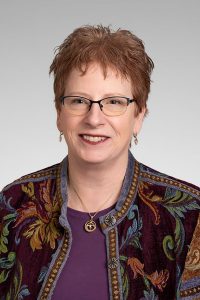
Mary Kiernan
Full Teaching Professor, Department of Nutrition and Food Studies
Mary Kiernan, M.B.A., worked in events at the then-Carrier Dome starting 2000 and was elevated to Catering Manager before being hired as a Chef Instructor in the Nutrition and Hospitality Management program in 2007. She was appointed as an Associate Teaching Professor of Food Studies in 2018. The breadth of courses that Kiernan teaches across the Food Studies and Nutrition programs exemplifies her versatility and value to the department.
Kiernan goes beyond educating her students in culinary and food systems and mentors them for careers and life in general. Her many service contributions include serving as the Undergraduate and Minor Director for Food Studies, Co-Chair of the Syracuse University Community Review Board, and Faculty Senator, and being active in her profession with several local and state organizations.
From Department of Nutrition and Food Studies Chair and Associate Professor Lynn Brann:
“Professor Kiernan is reflective of what has worked in the classroom and uses this knowledge to improve the experience for students. Many of Professor Kiernan’s courses involve cooking/food labs. These hands-on experiences are where she shines in the classroom. Students’ knowledge, skills, and confidence grow over the course of a semester and often this is a result of much trial and error.
“In the Farm to Fork class, she guides students to use fresh local produce to create delicious and nourishing meals. In a different course, she leads nutrition students through the process of developing, procuring, and preparing three-course meals that are enjoyed by the campus and community. Professor Kiernan models professional skills and behaviors to students and supports them inside and outside of the classroom to find their passions.”
Learn more about Mary Kiernan.
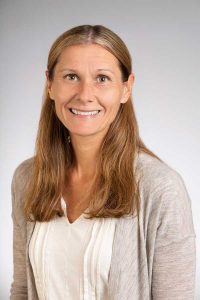
Rachel Razza
Associate Dean of Human Dynamics and Full Professor, Department of Human Development and Family Science
Rachel Razza, Ph.D., joined Syracuse University in 2007 as an Assistant Professor and was promoted to Associate Professor with tenure in 2015. She is an accomplished scholar who has made significant contributions to the field of human development through peer reviewed journal articles, book chapters, academic presentations, and invited lectures. The research program she has established has been supported by external funding totaling nearly $700,000, with additional grant submissions currently under review.
Razza has made significant service contributions to the Department of Human Development and Family Science as chair, graduate program director, and member of several departmental and college committees. Her service contributions extend beyond Falk College as she has been a member of numerous University-level committees and an active leader in multiple professional organizations.
From Falk College Dean Jeremy S. Jordan:
“Dr. Rachel Razza’s promotion to Associate Dean reflects her exceptional contributions to our college. Her extensive research experience, leadership roles, and service commitments have prepared her well for this new position. As Associate Dean, Dr. Razza will undoubtedly leverage her expertise to further enhance our academic programs and research initiatives, continuing to make a significant impact on our college and the broader field of human dynamics.”
Learn more about Rachel Razza.
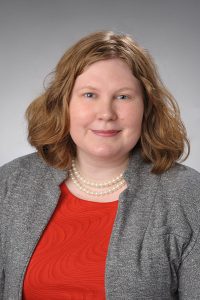
Sara Vasilenko
Associate Professor with Tenure, Department of Human Development and Family Science
Sara Vasilenko, M.S., Ph.D., joined the Syracuse University faculty in 2018 and since that time has developed six courses at the undergraduate and graduate levels. In 2022, she was nominated by her graduate students to receive the University-wide Excellence in Graduate Education Award, and she was honored with the Falk College 2020 Faculty of the Year in Research Award.
Vasilenko’s research has been funded by numerous internal and external grants from prestigious sources, including the National Institute on Alcohol Abuse and Alcoholism, National Institute of Child Health and Human Development, and National Institute on Drug Abuse. For an early career academic, Vasilenko has an impressive publication record with 67 peer-reviewed publications and nearly 2,500 citations of her work. Since arriving at Syracuse University, she has published 12 first-authored journal articles and five book chapters.
From Department of Human Development and Family Science Chair and Associate Professor Matthew Mulvaney:
“Dr. Vasilenko is both an excellent researcher and transformative mentor in our graduate program. The impact of her work is being felt throughout the field of adolescent health. Her innovative and complex research projects employ cutting-edge methodologies to answer some of the most pressing questions central to adolescent well-being.
“Her work is consistently published in the highest-ranked journals and widely cited. Dr. Vasilenko also serves as an exemplar of a scholar-mentor, training the next generation of scholars in her lab that will make further advancements to the field. She offers her time and expertise generously in order to train scholars to the very highest level and so has been recognized with the university-wide Excellence in Graduate Education Award. Her students in her classes and lab have the opportunity to make their own unique impact on the field through their own high-level scholarship.”
Learn more about Sara Vasilenko.
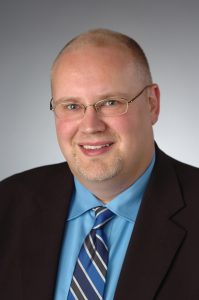
Patrick Walsh
Department Chair and Full Professor, Department of Sport Management
Patrick Walsh, Ph.D., joined Syracuse University in 2014 as Assistant Professor in the Department of Sport Management and was promoted to Associate Professor with tenure in 2017. His program of research focused on sport marketing and brand management has resulted in 39 peer-reviewed journal articles, establishing him as a leading scholar in the field.
Walsh has engaged in noteworthy department, college, university, and professional service activities. At the departmental level, he is coordinator for the Emerging Sport Enterprises Minor and the Sport Revenue Management and Operations Minor. At the college level, he has served on the Falk College Faculty Council, Promotion and Tenure Committee, and Grievance Committee.
From Falk College Dean Jeremy S. Jordan:
“Dr. Patrick Walsh’s appointment as department chair marks an exciting new chapter for our Sport Management program. His expertise in sport marketing and brand management, combined with his experience in program coordination and college service, positions him perfectly to lead the department. As chair, Dr. Walsh will undoubtedly enhance our curriculum, strengthen our research profile, and prepare our students for successful careers in the rapidly evolving sports industry.”
Learn more about Patrick Walsh.
CBT at Falk
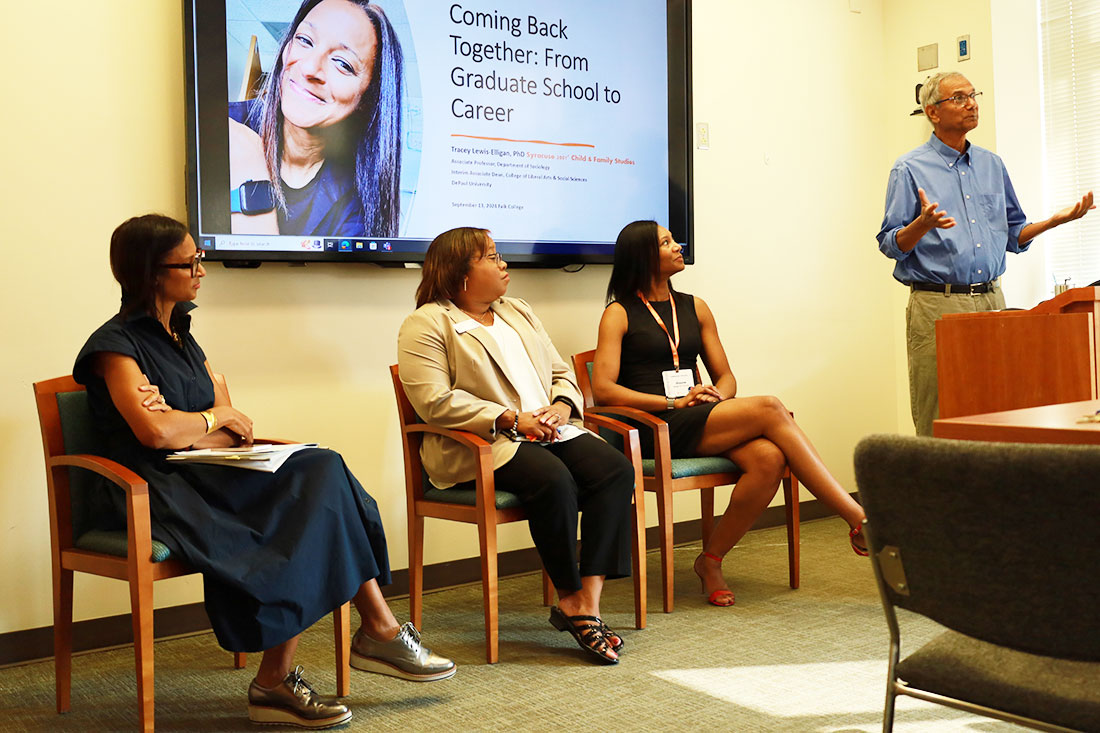
You can’t reach your goals alone.
That was a common theme from Syracuse University alumnae during two Coming Back Together events on Sept. 13 at the Falk College of Sport and Human Dynamics. Coming Back Together (CBT) is a triennial event for Black and Latino alumni to return to campus and celebrate their accomplishments, meet current students, and remain connected to Syracuse.
Falk College hosted two CBT alumnae panels: A discussion with three former doctoral students hosted by the Department of Human Development and Family Science (HDFS), and a panel discussion with three sport industry leaders called “Breaking Barriers and Empowering Women in Sport.”
The HDFS panel included Tracey Lewis-Elligan G ’01, Ph.D., Interim Associate Dean for Research and Graduate Programs and Associate Professor of Sociology at DePaul University; Shauna Harps ’99, G’05, Ph.D., Principle Research Associate at Westat in Rockville, Maryland; and Chandice Haste-Jackson ’96, G’13, Ph.D., Associate Dean of Student Services and HDFS Associate Teaching Professor in Falk College.
In chronicling their academic journeys and career trajectories, each of the three HDFS panelists highlighted the support they received from Syracuse faculty, including HDFS Pearl S. Falk Endowed Professor Jaipaul Roopnarine, HDFS Professor Ambika Krishnakumar, and Norma Bond Burgess, former chair of the Department of Child and Family Studies (now HDFS).
“The work of the faculty here resonated with me,” Lewis-Elligan said. “Of all my academic journeys, it was the people here who created relationships and invested in us.
“The work that Jaipaul and Ambika are involved in drive change and uplift society,” she added, “and that’s what we’re all here for.”
After receiving her undergraduate degree from Syracuse, Harps went to another school for her master’s degree but returned to Syracuse as a doctoral student.
“I felt very supported here, and when I didn’t get that support (in her master’s program), I came back to Syracuse and picked Ambika as my advisor because I knew she would push me and give me the support I needed,” Harps said. “Having that mentorship, I felt that my growth was important to my professors.”
The sport panel featured Syracuse women’s basketball head coach Felisha Legette-Jack ’89, NFL Players Association Director of Player Programs and Engagement Chineze “Chinny” Nwagbo ’05, and award-winning broadcaster Vera Jones ’88, G’91 (all former Syracuse basketball players) and was moderated by Tatiana Warren ’05, G’06, Ph.D., a member of the Falk College Advisory Board.
Among a variety of topics, the panelists discussed the growth and impact of women’s sports, the impact of mental health on performance, and personal development and empowerment. Watch the complete panel discussion on the Falk College Vimeo page.
While encouraged about the steady growth of women’s sports, the panelists said there’s more that needs to be done. They referenced the powerful ESPYs speech delivered by South Carolina women’s basketball coach Dawn Staley, who championed pay equity for women.
“What we have to consider is this: If we’re the same, we’re behind,” Legette-Jack said. “Dawn Staley is the best women’s coach in the world, but until we pay her more than the men’s coach, we have a lot of work to do.”
“Sports help drive the culture, and we have a responsibility to be that much more vocal, that much more active, because why wouldn’t we want to help drag the culture along, right?” Jones said.
In sharing very personal experiences that impacted their mental health, the panelists also emphasized the importance of mental health for everyone, not just athletes or those working in the sport industry.
“Athletes are driven to push, and we never stop,” Jones says. “I did that, and I didn’t think (mental health issues) would ever happen to me.”
During a question-and-answer session with students at the end of the event, the panelists were asked how women in sports can advocate for themselves in what remains a male-dominated industry. They described the value of the support they’ve received over the years from women and men, and how important it is to make connections that can help get you in the door so you can prove your value.
“How do you make the person in front of you understand that I’m all in and we’re going to go forward together?” Legette-Jack said. “What does my work say? What kind of character do I bring every day?
“Judge me on those things,” she added, smiling, “and pay me on those things.”
Social Determinants of Health
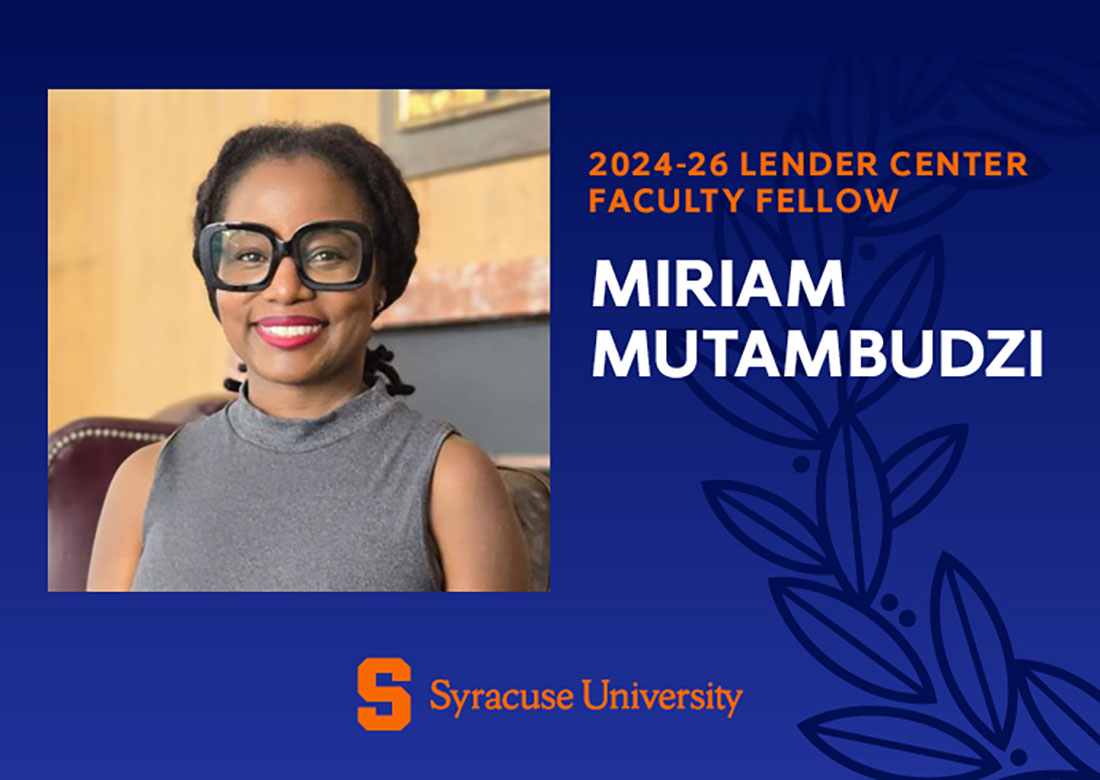
A public health professor whose research focuses on social determinants of health has been selected as the 2024-26 Lender Center for Social Justice faculty fellow.
Miriam Mutambudzi will explore how Black adults who reside in historically redlined neighborhoods can experience a disadvantaged occupational life course and subsequent health consequences. Redlining was a discriminatory practice of designating certain neighborhoods, especially predominantly Black ones, as being poor credit risks.
Mutambudzi is an assistant professor of public health at the David B. Falk College of Sport and Human Dynamics. She is also a faculty affiliate of three centers at the Maxwell School of Citizenship and Public Affairs: the Center for Aging and Policy Studies; the Aging Studies Institute; and the Lerner Center for Public Health Promotion.
In addition to Mutambudzi, an interdisciplinary team of student fellows will work on the project. Students from any discipline and background who are excited about community advocacy and social justice are encouraged to apply for the two-year fellowships. Applications are accepted through early October and fellows are chosen before the end of the fall semester. The faculty-student group will present their findings at a community symposium in 2026.
We recently sat down with Mutambudzi to learn more about her project.
Why is this topic important?
This research tackles the ongoing challenges faced by Black communities from the legacy of historical discriminatory housing practices and the subsequent impact of those practices on community members’ employment and health.
While the Fair Housing Act of 1968 was enacted as federal law, it failed to fully dismantle racial discrimination in housing resulting from the practice of redlining. Redlining is a discriminatory practice that began in 1930s America [where] banks and insurance companies refused or limited loans, mortgages and insurance to residents of specific geographic areas—primarily neighborhoods with predominantly Black residents. Residents of redlined areas had limited access to credit and other financial services and were hindered in their efforts to own homes, invest in property or improve their neighborhoods. The results were often urban decay and a perpetuation of poverty in those areas.
While redlining is a historical concept, its effects are very much present today. Its legacy continues to limit many life opportunities, and neighborhoods with predominantly Black residents where that occurred still face social and economic disadvantages.
How do limited employment prospects—or the lack of a good job—affect health issues?
Both employment and discriminatory policies are key factors contributing to racial disparities in health outcomes. Job insecurity, precarity, lower wages and periods of unemployment—which occur more frequently among Black workers—all contribute to income gaps and limit access to good health insurance and quality healthcare.
Young adults from disadvantaged neighborhoods enter the workforce at a significant disadvantage. Job prospects within their communities are scarce, limiting their ability to find work that pays well, offers stability and provides a path for advancement.
This lack of good-quality jobs in their immediate surroundings creates a vicious cycle and the absence of good-quality, stable employment nearby creates a double-edged sword. Not only are opportunities limited, but these young adults also miss out on crucial skill-building and networking chances that come with these jobs. Those factors further restrict their potential, hindering their ability to compete for better opportunities.
In addition, involuntary employment interruptions are more frequent for these young adults and further disrupt their career trajectories. This disparity perpetuates a system where economic mobility becomes nearly impossible for those starting from behind. The cascading constraints imposed by limited job opportunities in disadvantaged neighborhoods have a profound impact on residents’ access to health-promoting resources, creating a cycle that undermines well-being.
For example, limited financial resources often translate to poor housing conditions, which may be overcrowded, poorly maintained and may lack essential amenities. Nutritious and organic foods are generally more expensive and less readily available in “food deserts,” leading to a reliance on cheaper, processed unhealthy foods. The jobs in which Black workers are disproportionately employed may contribute to these health issues, as their work is more likely to be physically and psychologically demanding. All of these factors also combine to contribute to increased risks of health conditions such as obesity, diabetes, respiratory illness and hypertension.
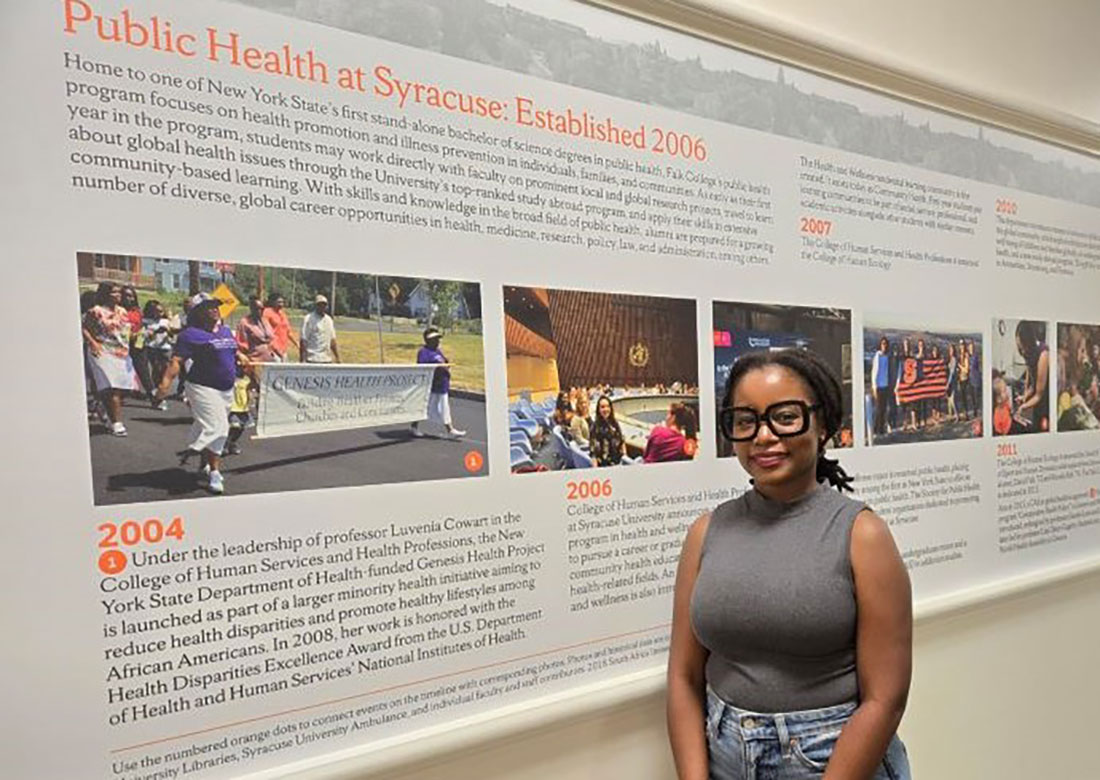
What questions are shaping your research?
There’s much we don’t know about how historically racist policies such as redlining continued to affect the employment trajectories of Black Americans. People can work for 45 years or more in their lives, so it’s essential that we understand the factors that shape occupational trajectories and the subsequent impacts they have on a person’s health.
This project looks at three areas: developing an understanding of historically redlined neighborhoods as predictors of racial disparities in long-term employment trajectories: seeing how employment trajectories may be predictors of chronic health conditions and determining how education might moderate those relationships.
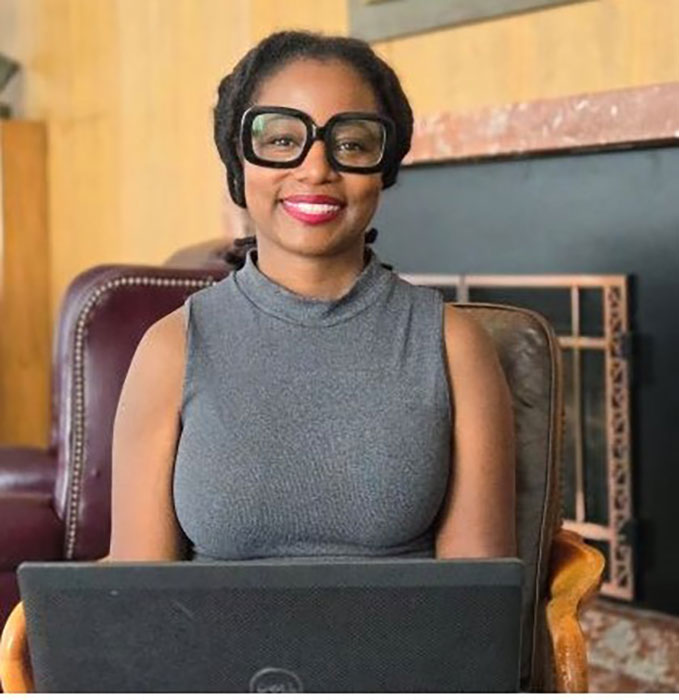
In what ways will the student fellows be involved?
They will contribute to data analysis and management and will conduct literature reviews to gather relevant reports on social and economic disparities and health outcomes. They’ll help synthesize findings to inform the study’s background and contextual understanding. Students will also have opportunities to engage with the local community since my goal is to work with grassroots organizations that are already addressing the adverse effects of redlining in Syracuse.
What do you hope to accomplish with this research?
My goal is to illustrate how the historical discriminatory redlining policy that systematically marginalized Black communities still adversely impacts work and health for those communities today, regardless of residents’ educational attainment.
Ultimately, we want to raise awareness regarding the lasting effects of discriminatory practices as fundamental social determinants of health that require much attention, and inspire policymakers, community leaders and the public to drive meaningful action.
A Syracuse University News story by Diane Stirling originally published on Aug. 16, 2024.
Two-Minute Warning
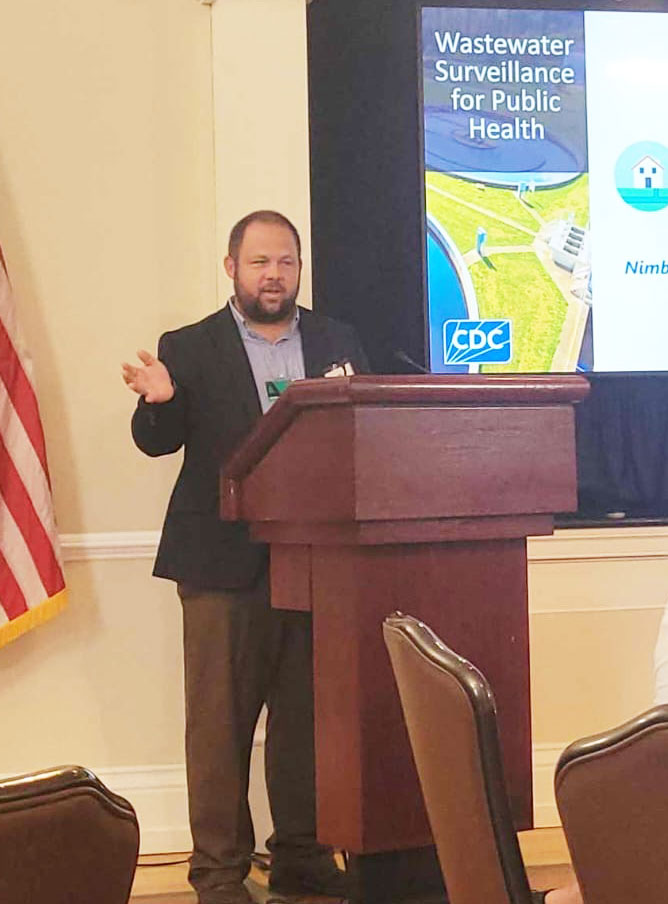
It’s not easy to condense about four years of research into two minutes, but that’s exactly what Syracuse University Public Health Professor David Larsen did during a visit to the White House on Aug. 27.
Larsen, Chair of the Department of Public Health in Syracuse’s Falk College of Sport and Human Dynamics, was invited to present to a panel of scientists, policymakers, and policy implementers at an information-gathering event called the “White House Roundtable on Emerging Technologies for Preventing Health Emergencies.” At the onset of COVID in 2020, Larsen spearheaded an interdisciplinary team of experts in coordination with the New York State Department of Health to create a wastewater surveillance system throughout New York State.
As one of many presenters during the three-hour roundtable, Larsen was given two minutes to discuss the merits of testing wastewater for COVID-19 and other infectious diseases.
“It was quite humbling to receive the invitation,” Larsen says. “I always hope that my work can influence public health, and since COVID-19 I’ve been trying to support the improvement of our infectious disease surveillance systems in New York State and this country.”
Today, the New York State Wastewater Surveillance Network is testing for COVID in at least one wastewater treatment plant in all 62 of the state’s counties, covering a population of 15.4 million. The New York State Wastewater Surveillance Network dashboard provides the most recent statistics regarding the network.
Days before Larsen’s trip to Washington, D.C., the Centers for Disease Control and Prevention (CDC) named the New York State Department of Health Wastewater Surveillance Program as a new Center of Excellence in the National Wastewater Surveillance System. New York’s system was recognized by the CDC for its exemplary performance in the early detection and monitoring of communicable diseases such as COVID-19, polio, influenza, and more.
This past spring, Larsen received a prestigious Fulbright U.S. Scholar Award to teach and continue his wastewater surveillance research at the Medical University of Innsbruck in Austria.
So, Larsen is clearly a leading expert in this field and he received the invitation to speak at the White House from Nicole Fehrenbach, the Branch Chief of the Rapid Response Research and Surveillance Branch of the CDC. The CDC is intimately familiar with Larsen’s work as the New York State Wastewater Surveillance Network is a part of the CDC’s National Wastewater Surveillance System.
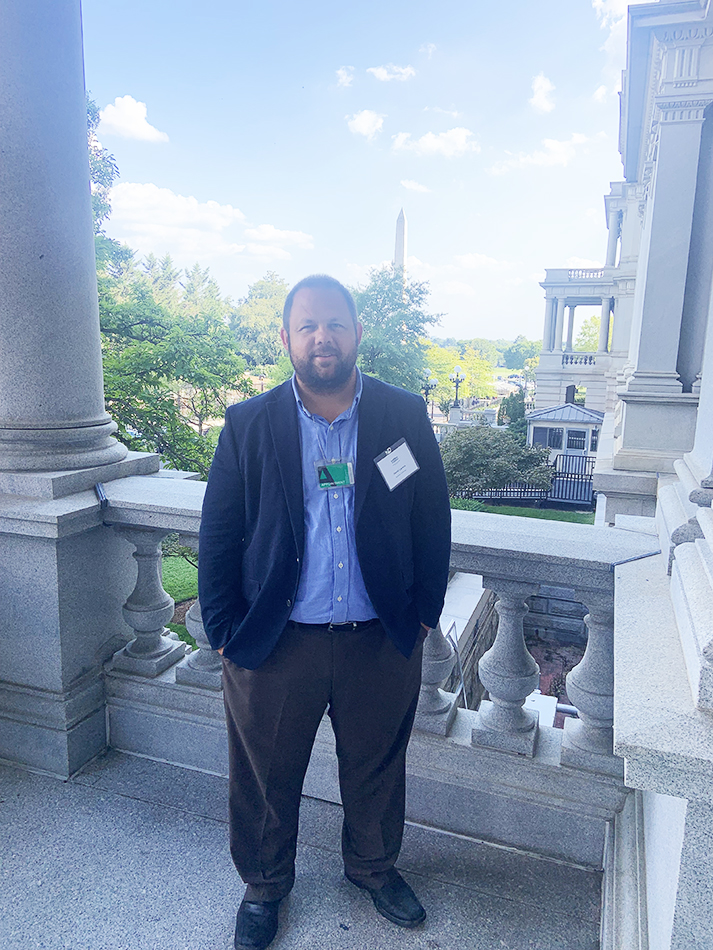
Larsen had visited Washington, D.C., before Aug. 27 and saw the White House from the outside, but he had never been in the complex until he attended the roundtable hosted by the White House Office of Science and Technology in the Eisenhower Executive Office Building.
“Walking into the Eisenhower Office Building and seeing the offices of the Chief of Staff and other executive officials and the west wing of the White House was a bit surreal,” Larsen says. “It was the culmination of a lot of hard work since March of 2020.”
During his “lightning talk,” Larsen says he emphasized that the functions of infectious disease surveillance are two-fold.
“First, they need to alert us when a community is at increased risk,” he told the panel. “And second, they need to confirm a community is no longer at risk.
“The Covid-19 pandemic showed how inadequately our systems performed in these two functions,” he added. “So, improvements are needed. Wastewater is a great way for both of these, and perhaps one of the most cost-effective ways to confirm a community is not at risk.”
Larsen says his remarks were “well received,” although he can’t share specific reactions because of the privacy guidelines for the roundtable. He’s encouraged that panelists were responsive because of the looming funding needs for wastewater surveillance.
“Right now, wastewater surveillance in the U.S. is largely being funded by COVID-19 emergency funds,” Larsen says. “As the emergency is over, those funds will expire. I hope that future funding will be made available to continue these efforts.”
Those efforts, which started on the campus of Syracuse University and now extend worldwide, will continue at Syracuse with Larsen leading the way.
“Right now, my team at Syracuse is focused on transitioning the operations of the program we’ve built in New York over to the State Department of Health,” he says. “That will allow us to dive deeper into the science and maximize the benefits of the systems.
“With the newly awarded Center of Excellence, we will support other states in the region, Puerto Rico, and the U.S. Virgin Islands,” he adds. “And then globally, the Europeans are leading an effort to coordinate global wastewater surveillance and we’ll continue to support those efforts.”
Giving Back, Together
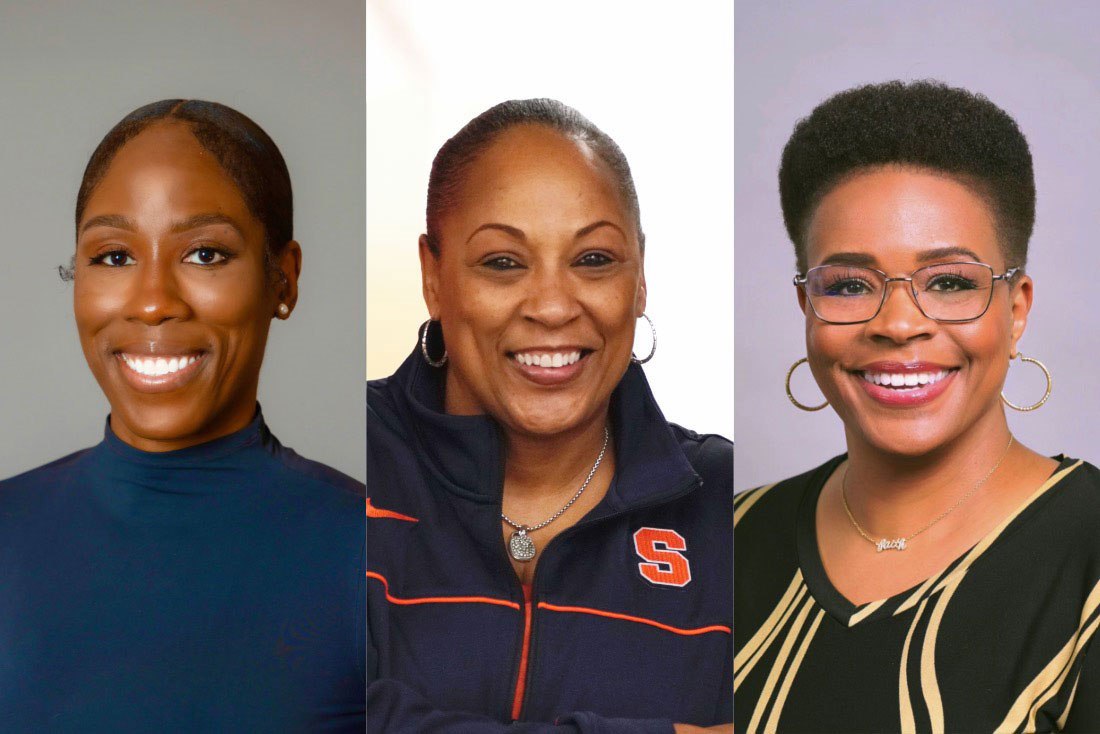
Knowing first-hand the benefits of mentorship and allyship in breaking barriers for women in all fields of work, Warren will be spending this year’s Coming Back Together weekend giving back to current students during two signature events at Syracuse University’s Falk College of Sport and Human Dynamics.
Coming Back Together (CBT) is a triennial event for Black and Latino alumni to return to campus and celebrate their accomplishments, meet current students, and remain connected to Syracuse. For this year’s CBT from Sept. 12-15, Warren will participate in a networking event for current students and moderate a star-studded panel discussion called “Breaking Barriers and Empowering Women in Sport.”
“Having mentors and allies who believe in your potential can make a significant difference in one’s career trajectory,” says Warren, a member of the Falk College Advisory Board. “Additionally, creating inclusive environments where diverse voices are heard and valued is essential for driving systemic change. It’s not just about giving women a seat at the table, but also ensuring they have the support and opportunities to thrive.”
Warren, fellow Falk College Advisory Board members Dr. LaTisha Marshall and Andrea Massop Ramos, MCN, and Sport Management Advisory Council member Jasmine Jordan worked together to create the Falk networking and panel discussion events.
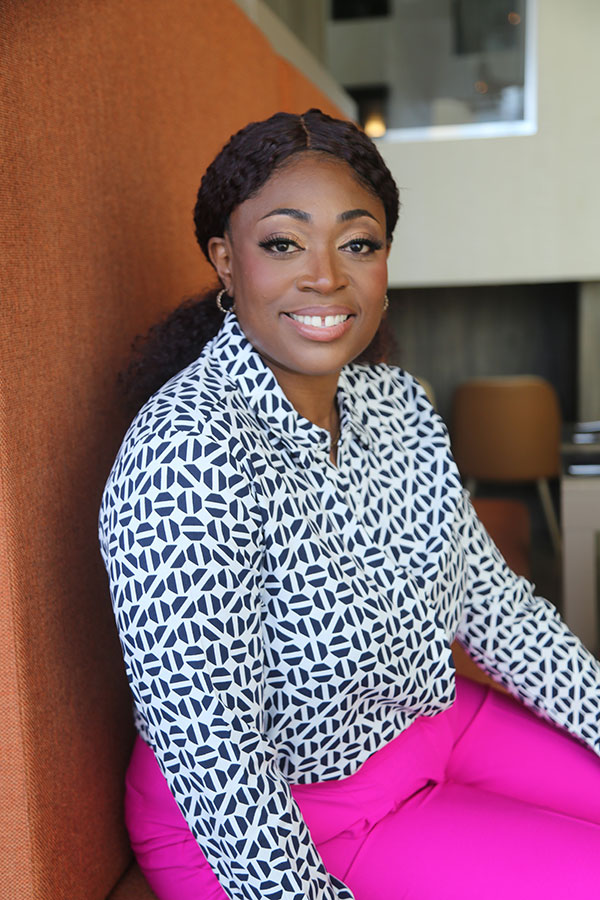
Warren earned her Bachelor of Science (’04) and Master of Science in Exercise Physiology (’06) degrees from Syracuse University, and her Ph.D. in public health with a focus on health aspects of physical activity from the University of South Carolina. Affectionately known as “Dr. Tati,” Warren is a distinguished health equity strategist and the founder of Just TATI, a multimedia initiative dedicated to disseminating accurate, evidence-based health information to diverse audiences. Warren consults with health professionals, community leaders, educators, and community members to implement and evaluate effective health programs.
Warren attended CBT for the first time in 2017 and says the weekend “was incredibly nostalgic” for her as she played in the inaugural CBT Celebrity Basketball Classic for former student-athletes.
“I’ve learned that Coming Back Together is a fantastic opportunity to bridge the gap across all generations, especially for Black and Latino communities, and invest in the future Syracuse leaders of tomorrow,” she says.
To that end, Warren, Massop Ramos, and other notable Syracuse University alums will participate in a speed networking event with students from 12-12:45 p.m. Sept. 13 in Room 335 at Falk College. Massop Ramos is a clinical nutritionist, private health chef, and entrepreneur who in 2018 founded Healthy FRIENDZ Nutrition to build independence and confidence in youth, students with disabilities, and the aging.
Warren says networking is a crucial gateway to establishing and advancing your career, and she has a wealth knowledge and experience to share after spending nearly two decades specializing in community engagement and improving health in underserved populations.
“My first job opportunity after completing my doctoral degree in healthcare was at a hospital, and it came about because I was a Syracuse University alumna,’’ Warren says. “I remember that interview being effortless; I simply discussed my experiences at Syracuse, highlighting how being a student-athlete and specifically a student-athlete of color laid the foundation for my commitment to community-based work from an equity perspective.”
The panel discussion featuring Syracuse women’s basketball head coach Felisha Legette-Jack, NFL Players Association Director of Player Programs and Engagement Chinny Nwagbo, and award-winning broadcaster Vera Jones (all former Syracuse basketball players) will run from 1-1:50 p.m. Sept. 13 in Grant Auditorium at Falk College.
Jones will also be the emcee and announcer for this year’s CBT Celebrity Basketball Classic. “This game is for those who can walk the walk,” Jones says. “I can talk the talk and that’s what I plan to do!”
Warren says the panel topic–Breaking Barries and Empowering Women in Sport–is important to her because she has spent her professional career breaking barriers as often the only woman or person of color serving boards or advisory groups that helped shape the future of health programs for people of color or people from marginalized communities.
“Empowering women in sports is close to my heart; as a former track and field athlete and recipient of the Doris Soladay Award, I understand the unique challenges and triumphs women face in this field,” she says. “This discussion’s theme extends beyond the sports industry as it highlights the broader issues of gender and racial equity, representation, and empowerment in all sectors of society.”
In addition to the networking event and panel discussion, Falk is sponsoring a table at the Sept. 14 “Shades of Orange Sneaker Ball,” a fundraising and alumni awards gala at the JMA Wireless Dome to support the Our Time Has Come Scholarship. Here’s a complete list of CBT events, and visit the Syracuse University website to register through Aug. 31.
Here’s more information about the guests for the Falk College panel discussion:
Felisha Legette-Jack, ’89
Head Coach – Syracuse University Women’s Basketball
“Coach Jack,” a Syracuse University alumna with degrees in child and family studies and psychology, returned to lead the Orange basketball program in 2022. With over 30 years of coaching experience, she has guided three Division I programs to 13 winning seasons, nine postseason berths, and six 20-win seasons, amassing a 343-279 record. Legette-Jack is enshrined in several halls of fame, including the Greater Syracuse Hall of Fame, the Syracuse Urban Sports Hall of Fame and the Syracuse University Orange Plus Hall of Fame. In 2021, she became the first female in Syracuse University history to have her No. 33 jersey retired in the JMA Wireless Dome rafters.
Chineze (Chinny) Nwagbo, ’05
Director of Player Programs and Engagement – NFL Players Association
Chinny Nwagbo, a former Syracuse University women’s basketball standout, graduated in 2005 with a degree in biology. She played professional basketball for 11 years in various countries and represented Nigeria in the 2006 World Championship Games. Post-retirement, Nwagbo has built a successful career in the sports industry with roles at the U.S. Department of State, PeacePlayers International, Monumental Sports & Entertainment, and more. She now serves as Director of Player Programs and Engagement at the NFLPA, creating resources to help professional athletes succeed beyond their playing careers.
Vera Jones, ’88, G’91
President. Vera’s VoiceWorks, LLC
Adjunct Professor of Public Speaking. University of North Florida
Vera Jones, is a motivational speaker, communication coach, author, and award-winning broadcaster. She has over 30 years of experience as a women’s basketball analyst and reporter for ESPN, Fox Sports, and NBA-TV. Vera hosts the women’s basketball show “Certified Unscripted” and the motivational podcast “Perseverance Live.” She holds a bachelor’s degree in broadcast journalism and a master’s degree in television, radio, and film from Syracuse University’s Newhouse School of Public Communications.
Welcome from the Dean
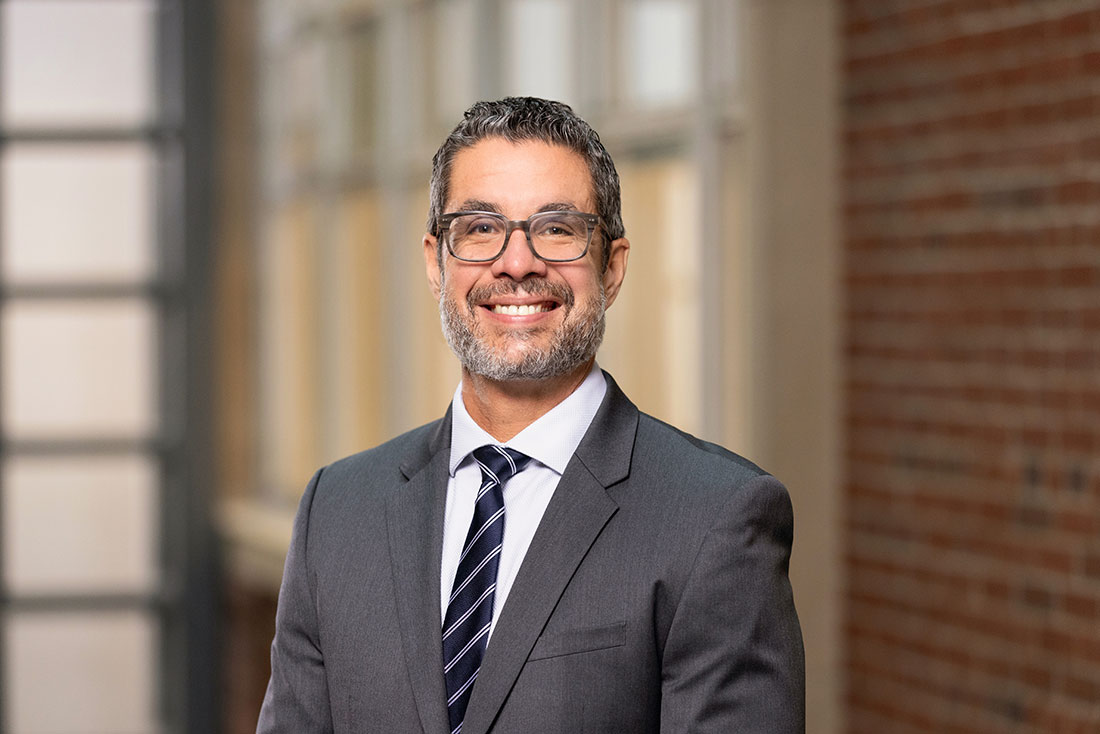
Dear Falk Students,
It is with great excitement that I welcome you to campus as we start the fall semester. This is my second year as Dean of Falk College and I’m still learning all that I can about this amazing institution. I encourage you to do the same and enjoy everything we have to offer!
I’d also like to give a special welcome to the Class of 2028 and our new transfer and graduate students! We are thrilled that you have joined the Falk College family, and we look forward to working with you as you pursue your academic and professional goals.
As classes begin, I want to remind you of resources on campus that will help you succeed:
Official Syracuse University Communications
Syracuse University email is the primary communication method at the University. Your professors and University offices will contact you with important information using your Syracuse University email address (ending in “@syr.edu”), not your personal email address. It’s important to read your University email at least once every day so you’re aware of the latest information that’s essential to you.
Student Support Services
Falk College Student Services is an important resource in your support system at Syracuse University. Student Services counselors are here to provide you with academic advising and help you meet your requirements and goals. In addition, they are your resource for private consultation related to student social and emotional concerns. If you have any concerns throughout your academic career, please contact Student Services or visit Falk 330, Barclay Suite in the Falk Complex.
I encourage you to connect with the staff at Falk Career Services, who can help you prepare for life after college through career exploration, internship and job searching, professional networking, and more. They are also located in Falk 330, or you can search for opportunities through Handshake, the University’s job search and professional events portal.
In addition, you can connect to spiritual life on campus at Hendricks Chapel, as well as health and counseling services in the Barnes Center at the Arch.
Student Spaces in Falk College
The Student Lounge, located in Falk 216, is available to you anytime the Falk Complex is open. The lounge has a microwave, refrigerator, and vending machines for student use. Across the hall is the Falk Café on 2, open 8:00 a.m. to 3:00 p.m. Monday through Friday starting Aug. 26. Visit the Food Services website for up-to-date operating hours for cafés and dining centers across campus. Just down the hall is Falk 229, the quiet student lounge.
There are several computer labs in the Falk Complex. Falk 113 is a PC lab, and Falk 229 is a quiet study area that has both PCs and Macs available for your use. Both spaces are available to students at any time. Falk 400 and 407 are PC labs that are also used as teaching classrooms.
When class is not in session, they are open for student use. You may check their schedule of availability using the 25Live website. You may also use the quick-print stations in Falk 216 and 229 for printing and email. These stations log out automatically after 10 minutes of use.
Ways to Get Involved
The Student Involvement Fair will be held Monday, Sept. 9, through Wednesday, Sept. 11, from 11 a.m. to 2 p.m. each day on the Quad. There are more than 250 student organizations at Syracuse University. Be sure to explore organizations that might be outside your usual interests, too. Remember, this is a great way to meet new people and discover something new about yourself!
There are many exciting events planned for Fall 2023, including two signature Syracuse University events: Family Weekend Sept. 27-29 and Orange Central, Syracuse University’s annual homecoming and reunion weekend, Nov. 1-3. You can discover activities and events on campus by visiting the Syracuse University Calendar.
There are countless ways to get involved at Syracuse University, and these are just a few suggestions to get you started. I encourage you to visit syracuse.edu/life/students for more resources and opportunities to make the most of your Syracuse experience.
All Falk students are invited to join me and Falk College faculty and staff for refreshments during meet-and-greets from 12-1 p.m. Tuesday, Aug. 27, and 1:45-2:15 p.m. Wednesday, Aug. 28, both in the breezeway between White and MacNaughton Halls. We hope to see you there!
I wish you every success on your journey here at Falk College. I am eager to see all the ways in which you will become part of—and add to—the Syracuse community.
Go Orange!
Jeremy S. Jordan, Ph.D.
Dean, Falk College
Welcome Class of 2028!
Welcome to Syracuse, new Falk College students! The newest Falk students in the Class of 2028 are a talented group from 39 states and 24 global countries. We welcome 354 first-year and 17 transfer students who join our new graduate students, 107 in residential programs and 147 online. We’re glad you’re part of the Falk College family, and altogether, the Falk College student body is 2,238 strong!
We look forward to meeting with you, your families, and friends at Syracuse Welcome. It is an exciting time of meeting new classmates and professors, and discovering all that our campus and region have to offer.
You can check out the main Syracuse University website for information about all events surrounding Syracuse Welcome and the start of the semester. Welcome to Falk College and Syracuse University!
Falk College Welcomes New Faculty
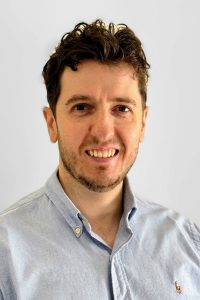
Matthew Armstrong
Matthew Armstrong, Ph.D., joins the Department of Exercise Science as an assistant professor of exercise science. This August, Armstrong founded the Applied Cardiovascular Physiology Lab at Syracuse University. Prior to joining Syracuse University, Armstrong was a postdoctoral fellow in the Department of Health and Human Physiology from 2021-24 at the University of Iowa, where he conducted research focused on large artery structure and function. Before moving to the United States, he completed a Ph.D. in Australia at the Menzies Institute for Medical Research, University of Tasmania.
Learn more about Matthew Armstrong.
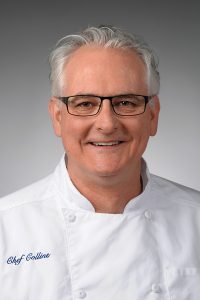
William Collins
William “Bill” Collins joins the Department of Nutrition and Food Studies as an assistant teaching professor. He will teach classes in Food Science and Culinary Arts. Prior to this appointment, Collins worked at Syracuse University for 17 years as a Culinary Specialist. Before joining Syracuse University, Collins spent 30 years as an Executive Chef and Food and Beverage Director operating restaurants in Manhattan and across Central New York. He was employed at Montrachet, TriBeCa Grill, Nobu, Reebok Sports Club, MacKenzie-Childs, the Aurora Inn, and his signature restaurant, bc, located in Armory Square in downtown Syracuse.
Learn more about Williams Collins.
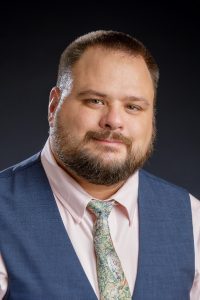
Jason DeFreitas
Jason DeFreitas, Ph.D., joins the Department of Exercise Science as chair and professor of exercise science. Prior to joining Syracuse University, DeFreitas was an associate professor and program coordinator of the Health and Human Performance program at Oklahoma State University. He spent 11 years at Oklahoma State, where he primarily taught classes in neuroanatomy and neuromuscular physiology. DeFreitas’ research focuses on how the brain controls movement, and how that control system changes with aging and/or training. His lab utilizes brain stimulation techniques, functional brain imaging, nerve conduction studies, and more. He has a strong applied focus with goals of reducing fall risk in older adults through physical activity interventions and improved diagnostic testing.
Learn more about Jason DeFreitas.
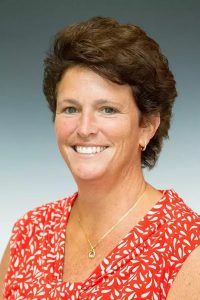
Sue Cornelius Edson
Sue Cornelius Edson joins the Department of Sport Management as a professor of practice. Edson currently serves as chief communications officer for Syracuse Athletics and is responsible for all public relations and media relations functions for the department. A 34-year veteran of Syracuse Athletics, Edson was promoted to her current role in the spring of 2015. Prior to her promotion, she served as associate director of athletics for communications (2006-14), assistant director of athletics for communications (2004-06), and director of athletic communications (1997-2004). Edson previously taught a class in sports public relations as an adjunct professor in Syracuse University’s S.I. Newhouse School of Public Communications from 1994 to 2013.
Learn more about Sue Cornelius Edson.
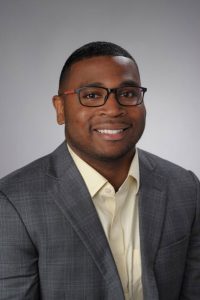
Brandon Hollie
Brandon Hollie, Ph.D., joins the Department of Marriage and Family Therapy as an online assistant teaching professor. He will primarily teach classes related to theories of Marriage and Family Therapy. Currently, Hollie is the Owner/CEO of Hollie Therapy and Counseling and a researcher at Mathematica Policy Research. Prior to Mathematica, he was a postdoctoral research scholar with the Family Institute at Northwestern University.
Learn more about Brandon Hollie.
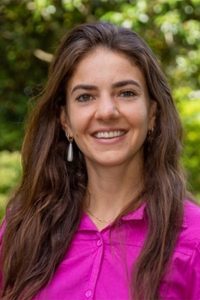
Alexia Lopes
Alexia Lopes, Ph.D., joins the Department of Sport Management as an assistant teaching professor. She will teach classes in International Sports Relations and Introduction to Sport Management. Her teaching focus will be on the international business of sport. Prior to joining Syracuse University, Lopes was an assistant professor from 2022-24 at St. Norbert College, where in two years she started two sport management programs (i.e., a minor and a major) in the Schneider School of Business and Economics. Beyond developing the sport management curriculum and teaching business courses, she was actively engaged in the Green Bay community.
Learn more about Alexia Lopes.
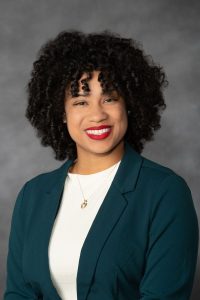
Britney Pitts
Britney Pitts, Ph.D., joins the School of Social Work as an assistant teaching professor in the online master of social work program (M.S.W.). Her teaching centers on anti-racism and social justice to support individual, family, and community well-being. Prior to joining Syracuse University, Pitts taught human behavior courses, advanced clinical practice courses, and generalist field instruction at Virginia Commonwealth University (VCU). She supervised M.S.W. and bachelor of social work (B.S.W.) interns and received the 2023 Liaison of the Year Award at VCU. Pitts also taught research courses at Iona University.
Learn more about Britney Pitts.
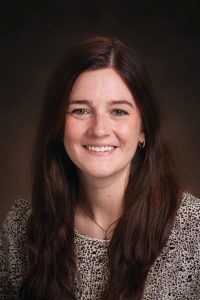
Kerianne Rubenstein
Kerianne Rubenstein, Ph.D., joins the Department of Sport Management as an assistant professor. She will teach classes in sport Analytics, primarily sport economics. Prior to joining Syracuse University, Rubenstein was an assistant professor from 2021-24 at North Dakota State University, where she taught economics and was a fellow with the Challey Institute for Global Innovation and Growth, and the Center for the Study of Public Choice and Private Enterprise.
Learn more about Kerianne Rubenstein.
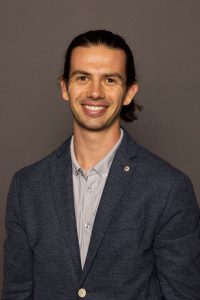
Riley Whiting
Riley Whiting, Ph.D., joins the Department of Marriage and Family Therapy as an assistant teaching professor. He will teach graduate courses for the Marriage and Family Therapy program. Whiting recently completed his doctorate at the Ohio State University, where he nurtured his passion for teaching, clinical work, and research. He enjoys working with individuals, couples, and families in a private practice, and finds satisfaction in seeking to inspire students both in the classroom and through research.
Campus Drug Prevention
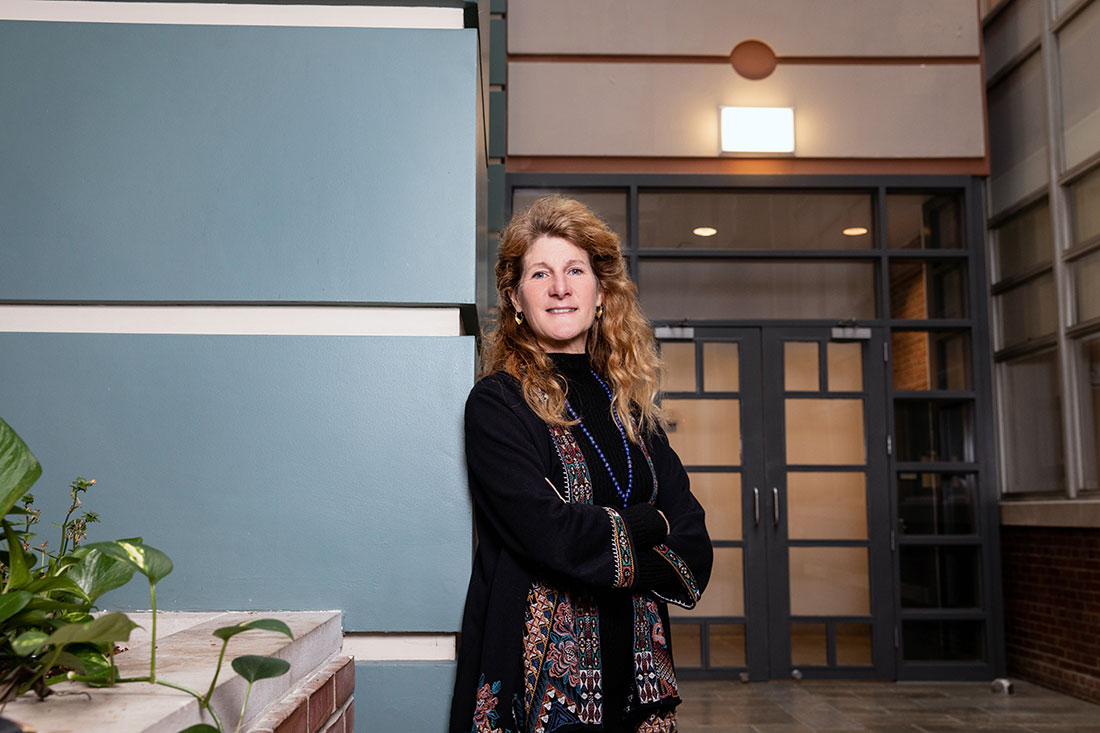
Dessa Bergen-Cico, professor and graduate director in the Department of Public Health in Falk College and coordinator of the Addiction Studies Programs at Syracuse University, was recently interviewed by the federal Drug Enforcement Administration (DEA) for its “Prevention Profiles” podcast series that is focused on campus drug prevention.
In the interview, Bergen-Cico speaks extensively about Syracuse University academics and student life and covers the evolution of her more than 25 years addressing substance use prevention. Watch the podcast on the Prevent Profiles website.
Here’s the description of the interview from the website: “During the interview, Dr. Bergen-Cico discusses how prevention in the higher education space has evolved since the early 1990s, how preventing drug use among college students can transcend being seen solely as a student affairs issue to a broader public health issue, some of the challenges faculty members face when it comes to drug use among college students, and more.”
Bergen-Cico is currently leading a research team that’s exploring how to combine an artificial intelligence system with mindfulness-based practices to help people in treatment for opioid use disorder. She co-developed the International Drug Policy Academy, which is one of several unique opportunities for students to obtain global experience that exposes them to new ways of thinking about substance abuse and addictive behaviors.
Bergen-Cico was recently selected as Falk College’s Honors Core Faculty member by a four-person committee in consultation with Falk Dean Jeremy Jordan and Honors Program Director Danielle Taana Smith.
Page 3 of 26
